Don't wanna be here? Send us removal request.
Text
Happy 54th birthday to David Tennant.
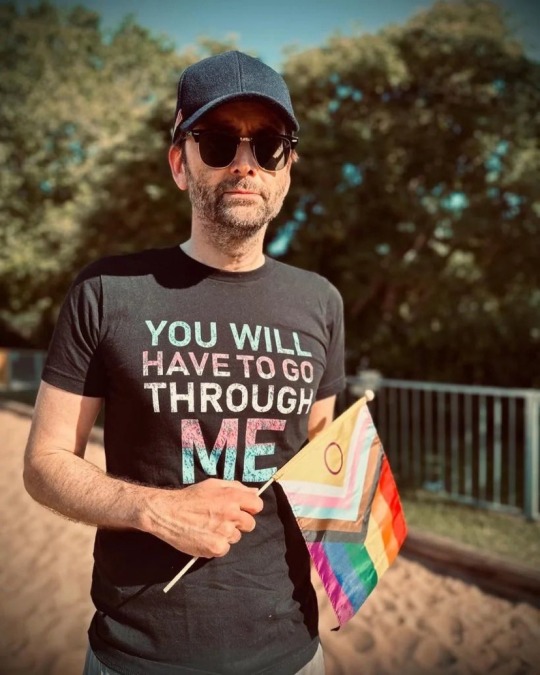
In a world of J.K. Rowlings, be a David Tennant.
Trans rights are human rights!

22 notes
·
View notes
Photo

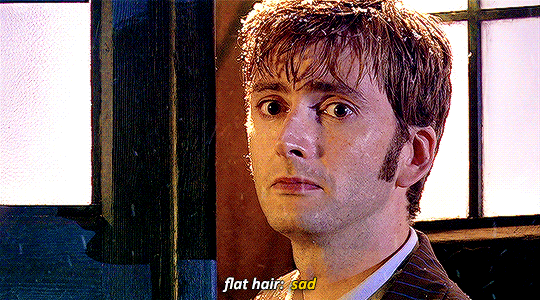

tenth doctor’s mood as told sometimes by the state of his hair
2K notes
·
View notes
Text
Gossip is such an utterly foreign concept to me. Imagine giving a shit about the activities of people who have fuck-all to do with you, and that you don't even like.
735 notes
·
View notes
Text
Finally got around to watching Secret Smile. My GOD, this was amazing acting! I don't think I can ever look at DT the same again!

#david tennant#secret smile#brendan block#amazing acting#i hate him in this so he did his job#how does he act this well#vilest tv character
4 notes
·
View notes
Photo
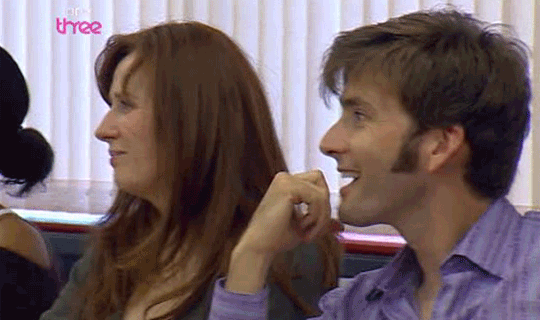
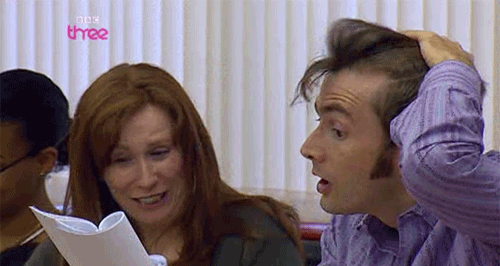
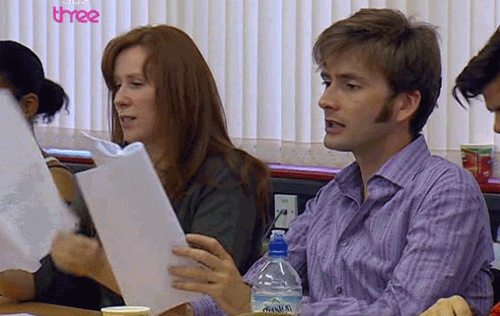
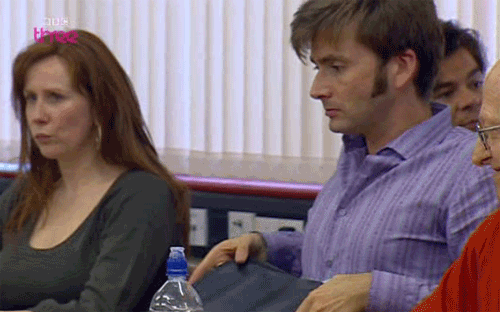
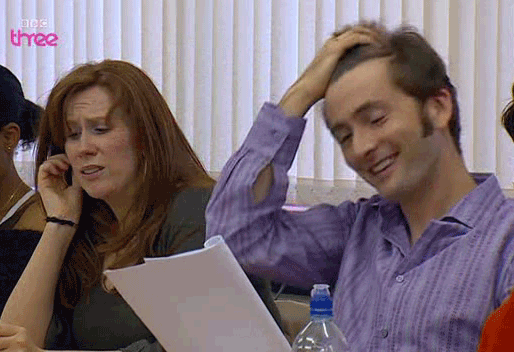
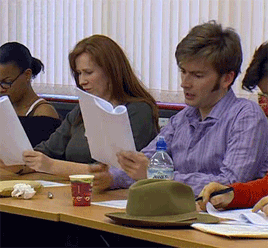
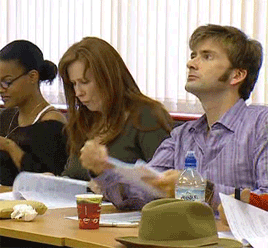
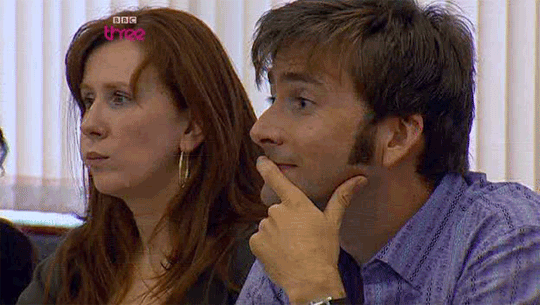
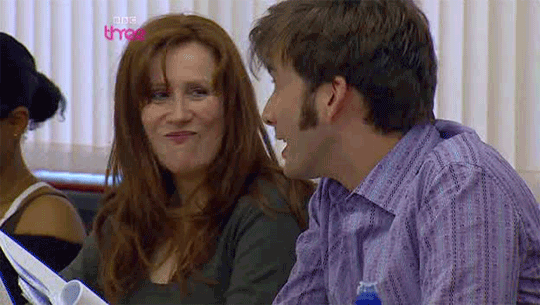
The Partners In Crime read-through
From the “A Noble Return” episode of Doctor Who Confidential
3K notes
·
View notes
Text
Things I have learned about DT today:
- moreso than I ever thought before, he is so entirely driven by guilt and the need to please. he hates not being liked, that's such a vulnerable thing to admit, to feeling that, even after arguably being quite beloved for a long time
this hurts because he's such a huge public figure without really wanting to be, openly criticized or hated or made fun of by critics or fans or people who think they know him because people don't see him as human, as having feelings, as being a person??
and it bothers me that David is so careful about not complaining about fame and yes he's privileged and yes he's wealthy but I would argue that being anonymous is a Huge privilege that you don't ever appreciate until you've lost it
- he is uncomfortable with, and afraid of, vulnerability in quite extreme ways. this was a trip, he is such a vulnerable actor
- his admitting to hearing all these nice compliments being quite overwhelming is just so. sweet.
- taking a moment to appreciate Georgia standing up for herself as having the right to not give a single shit about doctor who as the daughter of one lmaooo (and then admitting to have watched more NewWho than David has - shocking! - and even moreso to watching it without the kids around. I see how it is...) She may claim that her doctor is Sylvester McCoy but I have a sneaking suspicion that it's the man that lives in her house...
- at first I thought "David should interview Arabella and all these people who he so dearly loves" and then I was like - no wait. I love that it's their own group, their own found family. That David is "theirs" and I want them all to protect that so much
- It's amazing that he hasn't hardened with resentment or bitterness or skepticism after fame hit him like that. He's just so soft and so him ❤️ and he tries so hard to be Good, to be Grateful, to be Generous, he follows Georgia's lead as a parent because he trusts her and because he wants to do it right. It's beautiful
- he's softer and kinder perhaps than I even knew
163 notes
·
View notes
Text
In My latest re-watch of My favorite Doctor, 10, combined with 14, I saw his arch in a completely new light. As a recovering alcoholic, I drew so many lines in his story to the general message and step-work of AA, and it made it clear to me why I always related so much to this doctor in particular.
I am not saying this wouldnt necessarily be apparent for other incarnations, 10's arch is simply the one I am most in touch with.
Don't know where else to drop this, so here goes. The following is my own thoughts on 10, and 14's arch.
The 10th Doctor: Powerlessness, Grief, and Redemption - A Character Study and AA Journey
1. The Oncoming Storm – A Man of Extremes
The 10th Doctor is a paradox—energetic and passionate yet emotionally fragile and self-destructive. His greatest strengths are paired with his deepest flaws. He embodies both the savior of the universe and its most tragic figure. This duality is visible in his constant losses, avoidance of grief, and eventual recognition that running from his fate is futile.
Arrogance and Self-Destruction: His arrogance is central to his identity. In episodes like The Christmas Invasion, he punishes those who fail him, showcasing his ruthlessness even when he's supposed to be at his most joyful. He thrives on being needed but is often destructive in his need for control, highlighted by moments in The Fires of Pompeii and The Stolen Earth / Journey’s End where he loses sight of his own moral compass, leading to devastating consequences.
2. The Hero and the Martyr – Powerlessness and Survivor’s Guilt
The Doctor wants to be the hero, constantly trying to shape himself as a savior. However, beneath that mask is a deeply wounded man burdened by survivor’s guilt and the weight of his immortality. His role as the last of the Time Lords constantly reminds him of his failure to save his people, and he struggles with his guilt over their destruction.
Powerlessness and the “Time Lord Victorious”:
His inability to accept his limitations is clear in The Waters of Mars, where he defies the laws of time and causes more harm than good. His refusal to let go culminates in The End of Time, where his desperate struggle against inevitable death underscores his inability to face his own mortality and powerlessness. Like an alcoholic in AA, he fights against the reality of his limitations until it's too late.
3. The Curse of the Time Lords – The Weight of Immortality
Immortality is both a blessing and a curse for the Doctor. His attempts to break free from the rules he swore to uphold only increase his suffering. His character flaws, particularly his arrogance and desire for control, are magnified by the knowledge that he is the last of his kind.
The Struggle with Fate:
Episodes like Midnight and Turn Left showcase the Doctor’s vulnerability when stripped of his control. When he is without a companion or forced to face the consequences of his actions, he is exposed as just another fallible being. His journey becomes one of self-realization, acknowledging that no matter how hard he tries, he cannot escape fate, a sentiment echoed in his breakdown in The End of Time.
4. Grief as a Central Theme
Grief is central to the 10th Doctor’s journey. He never fully accepts the loss of his people, his companions, or his own innocence. From the heartbreaking goodbye to Rose in Doomsday to his final refusal to accept death in The End of Time, the Doctor's grief is palpable and shapes his every action.
Kubler-Ross’ Stages of Grief: His reaction to loss follows the stages of grief, but he never reaches acceptance. His denials and outbursts—such as his desperate claim that “time can be rewritten” in The Waters of Mars—show a man unable to let go. His final words, “I don’t want to go,” embody the ultimate denial of the inevitable, but in that moment, they also reveal the Doctor’s awareness of his deep fear of facing reality.
5. Connection and Fear of Attachment
One of the Doctor's most tragic traits is his intense craving for connection balanced by his fear of attachment. He longs for companionship but keeps others at a distance to protect himself from further loss.
Fear of Attachment: Episodes like The Girl in the Fireplace and The Runaway Bride highlight his emotional detachment, despite the profound connections he forms with others. He arrives either too soon or too late, never fully able to embrace the relationships he so desperately desires. His relationship with Donna in particular becomes crucial for grounding him, as she’s the one person who refuses to be charmed by his antics and forces him to confront his flaws.
6. The Tragic Downfall – Rock Bottom
Over time, the Doctor’s heroic persona crumbles. He becomes more self-destructive and disconnected, eventually facing his own powerlessness and mortality. His struggle to maintain control culminates in his last moments, where he must finally accept that he cannot save everyone, even himself.
Self-Realization and Acceptance: In his final breakdown to Wilf, the Doctor verbally acknowledges his powerlessness, something he’s resisted throughout his entire journey. Like an AA member in Step 1, he faces the truth—he is not in control. His willingness to sacrifice himself for Wilf, despite his deep fear, marks a pivotal moment of growth, even if it comes too late. In his final words, he acknowledges the irony of never fully accepting that he was never meant to be the hero forever.
7. The Meddling of a Co-Dependent Hero
The 10th Doctor is a classic co-dependent figure. His identity is shaped by the people he saves, and his refusal to let go of control is rooted in his need to feel needed. His dependence on others is highlighted in his constant struggles with the loss of companions, as shown in School Reunion and Voyage of the Damned. His fear of letting go is his ultimate undoing.
The Need for Control: His desperate need to be the hero—seen most clearly in Voyage of the Damned—is both a source of his strength and his downfall. His inability to let others take responsibility often leads to heartbreak and loss, particularly in episodes like The Stolen Earth / Journey’s End, where his failure to recognize his own limitations costs him dearly.
8. Redemption and Peace – Did He Find It?
After all his struggles and losses, there is hope for the 10th Doctor. In the Metacrisis, he is given a second chance, living a human life with Rose. This alternate version of the Doctor represents a kind of redemption—finally finding peace in a way the original Doctor never did.
The Search for Peace: The question remains whether the Doctor ever truly finds peace. Perhaps, across time and space, he finds a way to stop running, finally accepting that being loved is enough. Maybe, just maybe, the 10th Doctor, in his final moments, begins the journey toward true self-acceptance.
The 14th Doctor – Acceptance and Balance
By the time we see the Fourteenth Doctor, he has reached a point of acceptance. Where the Tenth Doctor was full of self-doubt, guilt, and a desperate need for approval, the 14th Doctor is in a much more balanced space. He has learned to love humanity, but without idolizing them or demonizing them. He has come to terms with his own identity and accepts his regeneration, no longer viewing it as a loss but as an evolution.
This newfound sense of peace mirrors the stages of recovery, where he no longer feels the need to constantly prove himself or save everyone. He begins to understand that he can still have adventures, but that he doesn’t need to run from his past or his own emotions. He embraces his true self and the human connections around him, allowing himself to finally have closure and peace. This marks a significant shift from the pain and turmoil that defined the Tenth Doctor.
---
The 15th Doctor – A New Beginning and the End of the Run
The arrival of the Fifteenth Doctor brings him closer to an even deeper sense of understanding. While the 14th Doctor allowed himself peace, it is the Fifteenth Doctor who realizes that he has to stop running from himself altogether. He learns to let go of the need to constantly fight fate and instead chooses to live a life in balance, with the freedom to still travel in his TARDIS, but no longer burdened by the overwhelming weight of saving everyone.
The 15th Doctor brings with it the ultimate form of self-acceptance. The Doctor can finally live, knowing that peace doesn’t mean abandoning adventure—it means finding harmony within it.
---
Final Thoughts:
The 10th Doctor’s journey is not just one of heroism but of profound tragedy. His flaws, his refusal to let go, and his inability to accept his own limitations make him one of the most compelling and heartbreaking characters in Doctor Who. Yet, through his flaws, he teaches us something vital: even the strongest among us can break, and even in tragedy, there is beauty and meaning. His legacy proves that sometimes, even when we don’t want to go—we must. Because time moves forward. And so must we.

#10th doctor#david tennant#character study#14th doctor#recovery#doctor who#deeper than it seems#alcoholics anonymous#steps
6 notes
·
View notes